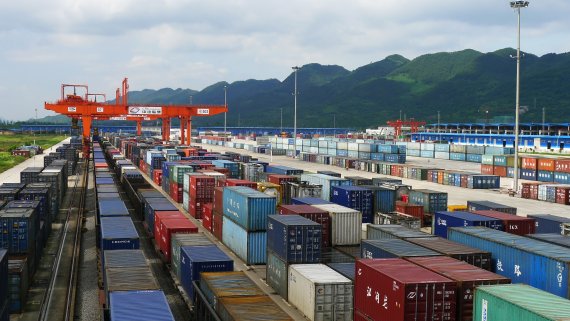De terminal van de YuXinOu Railway in Chongqing / Chongqing Logistics Council
In December 2014 Zhang attended the opening ceremony of YuXinOu railway from Rotterdam to Chongqing, China. There she heard that goods are transported by train from China to Rotterdam in merely thirteen days. That is longer than flying, of course, but also five times as cheap. Not to mention much less polluting. Compared to transportation by ship it is much faster – 30 to 40 days – and only 1.5 times as expensive. Sounds good, Zhang thought. So what are you transporting the other way around, from The Netherlands to China, she asked at that meeting? She was told that the trains often return mostly empty. This triggered Zhang to find out whether the Dutch agrifood sector could make use of the railway.
To her it’s clear: ‘The Chinese can also import their fruit, vegetables, meat, flowers and milk powder from elsewhere. For them it is not interesting to find out whether the train can be used to transport perishables. The question is: can The Netherlands afford to lose this market? It is the world’s second largest net exporter of agricultural products, but the export to China is still very limited.’
A cargo train that is mainly used to transport laptops and cars obviously needs some alterations to also carry fresh produce. ‘The train travels through an area where temperatures can rise to 45 degrees Celsius in summer and drop to -45 degrees in winter. Food products and flowers always have to be transported at the same temperatures and under stable air conditions. But that is just a matter of using reefer containers’, Zhang explains.
The train travels through an area where temperatures can rise to 45 degrees in summer and drop to -45 in winter
Xiaoyong Zhang
The next step, handling the goods after the train arrives at its final destination Chongqing, is also important. The train terminal in that industrial city is not yet allowed to clear products like fruit, vegetables, meat and milk powder, Zhang says, but the application process for this license is on the way. ‘Speedy custom clearance is important for exporters’, Zhang knows. ‘And Chongqing has a much faster clearance rate than other terminals in China’, she adds. ‘Parallel to our study, Rabobank is looking into the domestic logistic opportunities, like storage and further distribution to the rest of China. That looks really promising too.’ During the royal mission to China, Zhang gave an agrologistics seminar in collaboration with the Dutch bank.
More Wageningen in China
Other Wageningen researchers also presented their work in China this week. There were visits to the Sino-Dutch Dairy Development Centre and the COFCO Eco-Valley near Beijing. Wageningen UR is a partner in both those projects. An excursion was also organised to the erosion prevention programme on the Loess Plateau. Professor of Soil physics and land management Coen Ritsema, who has been working on the plateau for over twenty years, took this opportunity to tell King Willem-Alexander of The Netherlands about his work.
During the royal visit to China, Wageningen UR signed various contracts and memorandums of understanding with Chinese companies and universities. One such contract was signed with an investment group to design a “distinctive village”. Zhang, who is also the account manager China for Wageningen UR, explains: ‘The Chinese have come to realise the importance of the country-side. It is a place where people go to relax. Instead of clearing villages to make space for urbanization, the “distinctive village” aims to develop the rural area without moving the farmers from their land into flats in the cities. This village near Shanghai will be developed with respect for history and heritage.’
Large delegation visits China
China Town Wageningen

